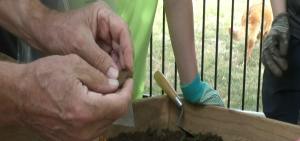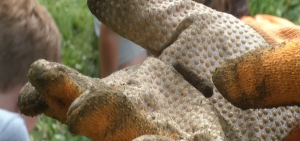News
An archaeology camp in Marietta is giving kids an opportunity to find hidden history
By: Betty Kankam-Boadu
Posted on:
MARIETTA, Ohio (WOUB) — “Oh, I found some brick, I got some brick!” Finley Patrick screams to his teammates.
Patrick is one of the middle schoolers digging and sifting through piles of soil to find hidden pieces of the past at The Castle Museum in Marrietta.
“My group has mostly found slate, which is the stuff from the roof,” said Patrick. “We also found a little bit of brick and coal and even found some paper.”
The Castle’s Archaeology Camp, which began Monday, is a weeklong summer camp organized by The Castle Museum every year.
Here, kids practice how to properly excavate, identify, wash and store artifacts.
The museum is built on a 19th-century pottery manufacturing site where the students are digging.

The students work in groups. Each has an area marked for digging. They use tools like shovels to dig and collect soil, trowels to scrape thin layers of soil, screens to sift the soil and zipper bags to collect interesting objects found.
Clarke says it may look like just digging holes to find things, but there is a science to what the kids are doing.
“We are using specific methods in a careful way to maximize the information,” said Clarke.

Clarke said, “Having done a lot of these field schools and camps over the years, a few of our participants have gone on to professional careers in archaeology.”
Rowen Fluharty plans to join this list soon.
“I hope to learn something that could be helpful in my future because I want to be a paleontologist,” said Fluharty.

